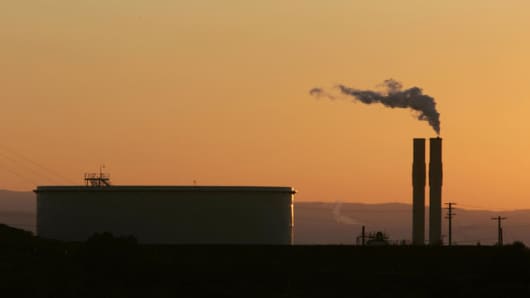Oil prices were down as Saudi Arabian officials told CNBC that the country is increasing November production ahead of a planned Dec. 5 meeting of the Organization of Petroleum Exporting Countries.
U.S. crude already was pressured by earlier, unconfirmed reports that the Saudis planned to increase production, as well as expectations that OPEC could decide to raise oil output at the meeting next week.
Sources inside the Saudi administration declined to speculate about whether the oil-rich state would alter its regular production quota.
Iran's Oil Minister Gholamhossein Nozari said at the weekend that some OPEC members were advocating an increase in production when they meet in Abu Dhabi on Dec. 5 to debate whether to raise output for a second time this year.
U.S. light, sweet crude for January delivery was below $98 a barrel. U.S. crude hit an all-time high of $99.29 last Wednesday.
London Brent crude was also lower after reaching a new record high of $96.65 earlier in the session.
"We believe the markets have yet to discount the outcome of the OPEC meeting, where there will be immense -- and we believe ultimately successful pressure -- on the cartel to raise quotas," said Edward Meir at futures broker MF Global.
Oil has risen more than 40 percent since August, boosted by a slump in the U.S. dollar to a series of record lows versus the euro that has spurred buying of oil, gold and other commodities.
The dollar edged back towards last week's record troughs versus the euro on Monday, depressed by a bearish view on the U.S. economy and expectations of more Federal Reserve interest rate cuts to help revive U.S. growth.
The weak dollar, expectations of a cold winter, plus investment inflows into energy are reasons behind an increase in average forecasts for oil prices next year to about $75 a barrel, according to a Reuters monthly poll.
"Our oil price scenario assumes a rise in the average price of oil to $100 at the peak of the winter season and a correction from March into spring," said Harry Tchilinguirian, senior oil analyst at BNP Paribas.
Cold Weather
The onset of colder weather in the U.S. Northeast, a major consumer of heating oil for household use, has contributed to the upswing in prices as traders bet higher winter demand will strain inventories that are lower than normal.
Temperatures in the region on Monday were near their norms for this time of year, according to The Weather Channel Web site (www.weather.com), but the U.S. National Weather Center's six to 10-day outlook calls for colder-than-usual conditions.
The United States has urged OPEC to boost production because of shrinking oil inventory levels in developed economies in the run up to the northern hemisphere winter.
The Organization of the Petroleum Exporting Countries agreed in September to raised output by 500,000 barrel per day (bpd), but this has so far failed to stem oil's advance.
Iranian minister Nozari said opinion among OPEC ministers regarding a second output boost was divided.
"Some countries agree with output increase and others believe there is a good balance between oil supply and demand," he told a news conference.
Most members have said publicly that they don't believe more oil is needed, or they say that an increase would not cool prices.
But no action from OPEC could have the effect of enticing more investment money into oil.
"Failure to increase supply further runs the risk of keeping it a one way street when the pension funds start to allocate assets for 2008," Olivier Jakob of oil consultancy Petromatrix said.
-- Reuters contributed to this report.


